
Health and Quality of Life Outcomes
Scope & Guideline
Exploring Innovations in Health and Quality of Life
Introduction
Aims and Scopes
- Patient-Reported Outcomes (PROs):
The journal emphasizes the development, validation, and application of patient-reported outcome measures across various diseases and conditions, highlighting their significance in assessing health-related quality of life. - Cross-Cultural Adaptation and Validation:
Research often involves translating and validating health-related quality of life instruments for diverse populations, ensuring that these measures are culturally relevant and psychometrically robust. - Systematic Reviews and Meta-Analyses:
The journal frequently publishes systematic reviews that synthesize existing literature on health-related quality of life, contributing to evidence-based practices and informing future research directions. - Methodological Innovations:
Innovative methodologies, including psychometric evaluations and new statistical approaches, are a key focus, enhancing the measurement and understanding of health-related quality of life. - Interdisciplinary Research:
The journal encourages interdisciplinary studies that incorporate perspectives from psychology, epidemiology, public health, and clinical medicine to better understand the multi-faceted nature of health-related quality of life.
Trending and Emerging
- Digital Health and Technology Integration:
There is an increasing trend towards the integration of digital health technologies, such as mobile health applications and telemedicine, in assessing and improving health-related quality of life, especially post-COVID-19. - Multimorbidity and Comorbid Conditions:
Research focusing on the impact of multimorbidity on health-related quality of life is emerging, recognizing that patients often experience multiple health conditions that interact and affect their overall well-being. - Mental Health and Quality of Life:
There is a growing emphasis on the relationship between mental health and quality of life, particularly in the context of chronic illnesses, highlighting the psychological dimensions of health outcomes. - Health Equity and Social Determinants of Health:
Studies exploring health equity and the influence of social determinants on health-related quality of life are gaining traction, reflecting a broader movement towards addressing disparities in health outcomes. - Longitudinal Studies on Quality of Life:
An increase in longitudinal studies is noted, which track changes in health-related quality of life over time, providing valuable insights into the dynamics of health outcomes across different populations.
Declining or Waning
- Generic Quality of Life Measures:
There seems to be a gradual decline in studies focusing solely on generic quality of life measures, such as the SF-36, in favor of more disease-specific or condition-specific instruments that provide more tailored insights into patient well-being. - Single-Disease Focus Studies:
Research that concentrates solely on the quality of life in single-disease populations is becoming less frequent, as there is a growing recognition of the complexity of comorbidities and the need for holistic approaches to health. - Traditional Psychometric Methods:
There is a noticeable reduction in the publication of studies using traditional psychometric evaluation methods, such as classical test theory, as newer methodologies like item response theory (IRT) are gaining traction. - Health Inequity Studies:
While health inequity remains an important topic, the number of studies specifically addressing health-related quality of life disparities across socioeconomic groups appears to be decreasing, potentially overshadowed by a focus on other pressing health challenges.
Similar Journals

Journal of Diabetes Investigation
Exploring the frontiers of diabetes and metabolism.Journal of Diabetes Investigation is a prestigious open-access journal published by WILEY, dedicated to advancing knowledge in the fields of Endocrinology, Diabetes, and Metabolism. With its ISSN 2040-1116 and E-ISSN 2040-1124, the journal provides a vital platform for researchers, healthcare professionals, and students to disseminate high-quality research, foster innovative ideas, and engage with cutting-edge developments in diabetes investigation. Since its inception in 2010, the journal has established a solid reputation, ranking in Q2 for Endocrinology and Diabetes and Metabolism, and Q1 for both Internal Medicine and Miscellaneous Medicine categories in 2023. Its Scopus rankings further underscore its impact, notably at the 76th percentile in Internal Medicine. The open access model, adopted in 2014, ensures that vital information is freely available, promoting global collaboration and knowledge sharing. The journal is not only a reflection of Australia's commitment to medical research but also a beacon for advancements that can ultimately enhance patient outcomes in diabetes care.
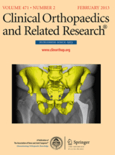
CLINICAL ORTHOPAEDICS AND RELATED RESEARCH
Shaping the Future of Orthopaedics Through Cutting-Edge ResearchClinical Orthopaedics and Related Research, published by Lippincott Williams & Wilkins, is a premier journal within the fields of orthopaedics and sports medicine, boasting a distinguished history since its inception in 1963. With an impressive impact factor and ranking within the top quartile (Q1) in multiple categories, including Medicine (miscellaneous), Orthopedics and Sports Medicine, Sports Science, and Surgery, this journal consistently delivers high-quality, peer-reviewed research that shapes contemporary practices and advancements in these critical areas. The journal is a vital resource for researchers, clinicians, and students, offering impactful studies and clinical trials that inform evidence-based practice and elevate the standards of patient care. With a strong commitment to the dissemination of innovative findings, Clinical Orthopaedics and Related Research serves as an essential platform for the exchange of ideas and discoveries that drive the future of orthopaedic health.

Journal of Health Economics and Outcomes Research
Elevating healthcare efficiency through rigorous research.Journal of Health Economics and Outcomes Research, published by COLUMBIA DATA ANALYTICS, LLC, serves as a vital resource in the field of health policy and public health, providing researchers, professionals, and students with open access to pioneering studies since its inception in 2013. With its ISSN and E-ISSN both listed as 2327-2236, this journal aims to disseminate high-quality research that evaluates healthcare efficiency and outcomes. Situated in the United States, at 145 Hudson St., Suite 205, New York, NJ 10013, it has made significant strides in its category quartiles within the 2023 rankings, achieving Q2 status in both Health Policy and Public Health, Environmental and Occupational Health. Furthermore, it maintains respectable Scopus rankings, with a percentile of 51st in health policy and 49th in public health. By bridging gaps in health economics and policy discourse, the journal stands as an indispensable platform for advancing knowledge and fostering innovation in health services research.

SUPPORTIVE CARE IN CANCER
Fostering interdisciplinary collaboration in supportive care.SUPPORTIVE CARE IN CANCER is a premier academic journal published by Springer, dedicated to advancing the understanding and management of supportive care for cancer patients. With a notable impact factor, the journal is recognized for its contribution to the fields of Oncology, Rehabilitation, and Nursing, achieving impressive rankings in Scopus, including Q1 for Oncology Nursing and Rehabilitation, and Q2 for general Oncology. Founded in 1993 and looking towards a promising future until 2024, it serves as a vital resource for researchers, professionals, and students engaged in these critical areas of healthcare. Although not an Open Access journal, its rigorous peer-reviewed articles provide valuable insights into innovative practices and evidence-based strategies that enhance patient quality of life during and after treatment. By bridging the gap between research and clinical practice, SUPPORTIVE CARE IN CANCER significantly influences patient outcomes and fosters interdisciplinary collaboration in patient support.
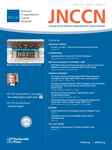
Journal of the National Comprehensive Cancer Network
Advancing Oncology: Pioneering Research for Better Patient OutcomesThe Journal of the National Comprehensive Cancer Network (ISSN: 1540-1405, E-ISSN: 1540-1413) is a premier publication in the field of oncology, established by HARBORSIDE PRESS and running since 2003. This highly respected journal holds a remarkable Q1 ranking in both Medicine (Miscellaneous) and Oncology categories, showcasing its significant influence and contribution to cancer research, with a Scopus ranking placing it within the top 5% of its field (Rank #20 out of 404). Aimed at a diverse audience including researchers, clinicians, and students, the journal publishes a wide range of articles that explore cutting-edge findings, clinical practices, and evidence-based guidelines in cancer care. With its commitment to advancing the understanding and treatment of cancer, it serves as a vital resource for professionals dedicated to improving patient outcomes. Although it does not currently offer open access, its impactful content continues to be a cornerstone for anyone involved in oncology research and practice.

Dental and Medical Problems
Connecting Professionals to Transform HealthcareDental and Medical Problems, with ISSN 1644-387X and E-ISSN 2300-9020, is a distinguished open-access journal published by WROCLAW MEDICAL UNIVERSITY since 2009. Located in Poland, this journal serves as a vital platform for the dissemination of high-quality research in the fields of dentistry and medicine. The journal has earned a respectable Q2 ranking in both the Dentistry (miscellaneous) and Medicine (miscellaneous) categories for 2023, reflecting its significant impact within the academic community, as evidenced by its Scopus rank of #41 out of 132 for general dentistry. Aiming to bridge the gap between clinical practice and innovative research, Dental and Medical Problems provides a comprehensive forum for professionals, researchers, and students to access cutting-edge findings and contribute to ongoing discussions in the health sciences. As the journal continues to evolve until 2024 and beyond, it remains committed to advancing knowledge and enhancing patient care through rigorous scholarship and collaboration.
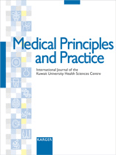
MEDICAL PRINCIPLES AND PRACTICE
Empowering healthcare through open access research.Medical Principles and Practice is a renowned journal within the field of health sciences, disseminating cutting-edge research and insights since its inception in 1989. Published by Karger in Switzerland, this Open Access journal has committed itself to making valuable medical knowledge freely accessible to the global research community since 2013. With an impressive impact factor and ranked in the Q2 category of Medicine (miscellaneous) for 2023, it holds a prestigious position, currently occupying the 70th rank out of 636 in the Scopus category of General Medicine, placing it in the 89th percentile overall. The journal’s dedication to merging theoretical principles with practical applications makes it a critical resource for researchers, healthcare professionals, and students aiming to enhance their understanding and application of medical knowledge. Published in Basel, Switzerland, this journal paves the way for pioneering discussions and advancements in medical practice, ensuring that its audience remains at the forefront of the rapidly evolving healthcare landscape.

Journal of Patient-Reported Outcomes
Unlocking the Power of Patient-Reported InsightsWelcome to the Journal of Patient-Reported Outcomes, a premier platform dedicated to advancing the field of health informatics and health information management. Published by SPRINGERNATURE since 2017, this Open Access journal allows researchers and practitioners globally to disseminate vital research findings, ensuring that insights into patient-reported outcomes reach a wider audience without barriers. With its current standing in the Q2 quartile for both Health Informatics and Health Information Management in 2023, it is positioned as a significant contributor to the healthcare research community, ranking 76th out of 138 in Medicine and 34th out of 59 in Health Professions. The journal aims to publish high-quality, peer-reviewed articles that explore innovative methodologies, enhance clinical decision-making, and ultimately improve patient care outcomes. By offering a platform for interdisciplinary collaboration, the Journal of Patient-Reported Outcomes fosters a deeper understanding of patients' perspectives in healthcare, making it an essential resource for researchers, professionals, and students alike.
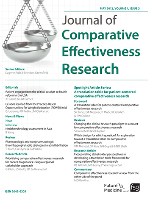
Journal of Comparative Effectiveness Research
Advancing health policy with rigorous evaluation.Journal of Comparative Effectiveness Research is a leading academic journal dedicated to the evaluation of healthcare interventions and practices, published by Becaris Publishing. Since transitioning to a fully Open Access model in 2023, the journal has expanded its accessibility to a global audience of researchers, healthcare professionals, and policy makers. With a focus on comparative effectiveness in health policy, it has achieved a notable ranking of #132 out of 310 in the Scopus category for Medicine and Health Policy, placing it in the 57th percentile for scholarly impact. Operating from the United Kingdom, the journal encompasses research from 2012 to 2024 and firmly establishes itself in the academic landscape as a Q2 journal in the Health Policy category as of 2023. By disseminating high-quality, evidence-based research, the Journal of Comparative Effectiveness Research plays a vital role in informing clinical practice and health policy decision-making, making it an essential resource for those dedicated to improving health outcomes.
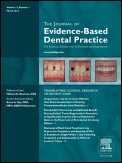
Journal of Evidence-Based Dental Practice
Advancing Dental Science, One Study at a Time.Welcome to the Journal of Evidence-Based Dental Practice, a premier resource for cutting-edge research in the field of dentistry, published by Elsevier Inc. With an impressive impact factor and recognition as a Q1 journal in the miscellaneous category of dentistry for 2023, this journal serves as a critical platform for disseminating high-quality, evidence-based studies that influence practice and policy in dental care. Since its inception in 2001, it has provided valuable insights that rank it among the top 15% of journals in the general dentistry category, making it a crucial reference for researchers, professionals, and students dedicated to advancing dental science and patient care. Accessing the wealth of knowledge within its pages allows practitioners and scholars to stay informed about the latest advancements and methodologies in evidence-based dental practice. Your engagement with this journal helps foster a deeper understanding of best practices and innovative solutions in dentistry.